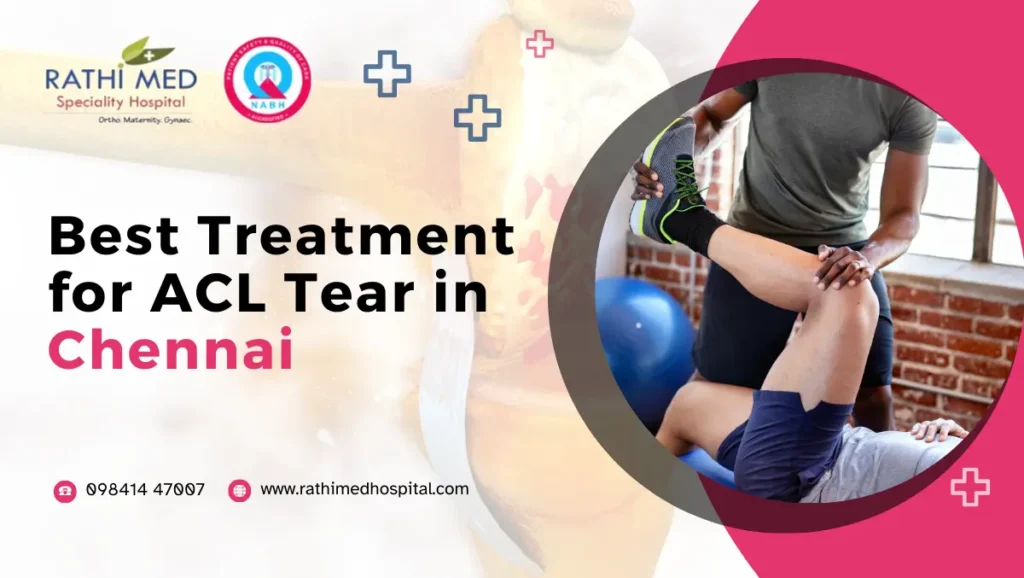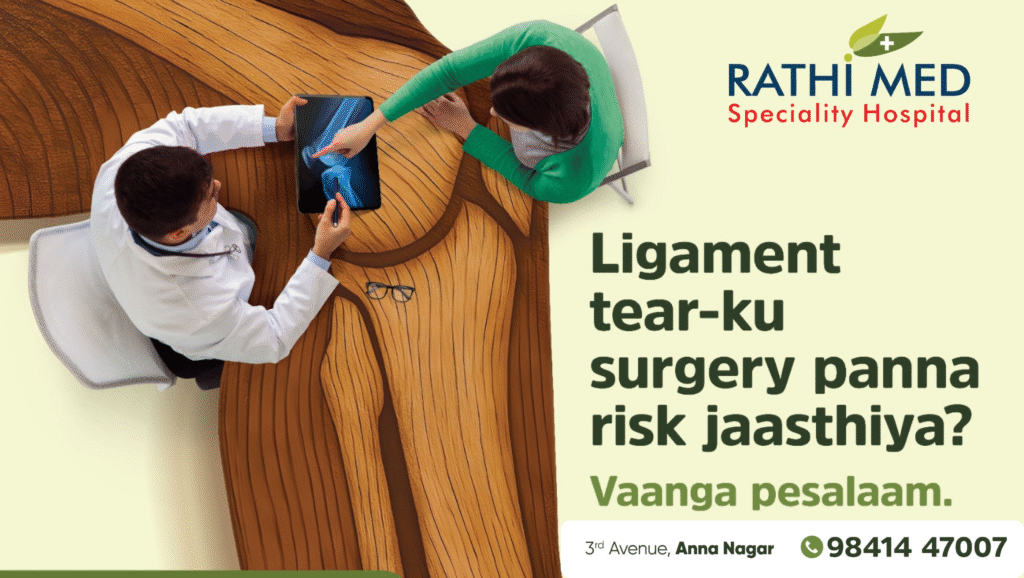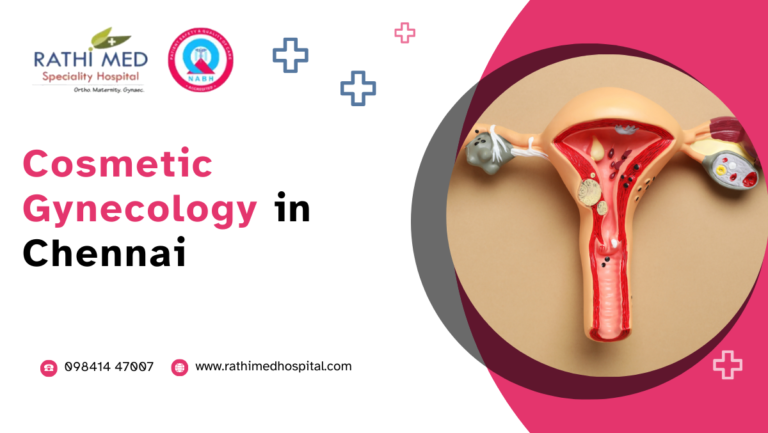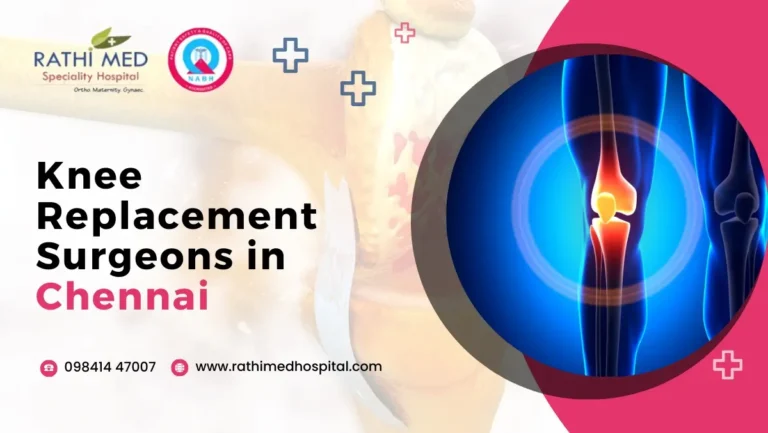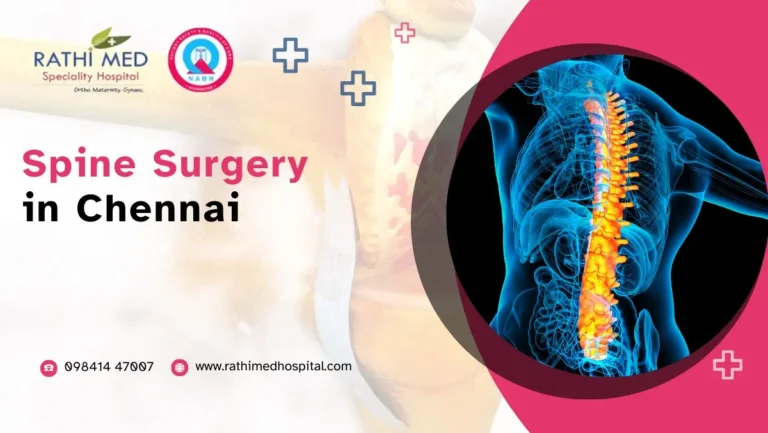An ACL (Anterior Cruciate Ligament) tear is one of the most common knee injuries, often occurring during sports or high-impact activities. When an ACL tear happens, it can be debilitating, and finding the best treatment for ACL Tear in Chennai is crucial to ensure a full recovery. Whether you’re an athlete, fitness enthusiast, or someone recovering from an accident, understanding your options for ACL treatment is key. In this blog, we will explore the best treatment options for ACL tears in Chennai, including non-surgical methods and surgery, and guide you through the recovery process
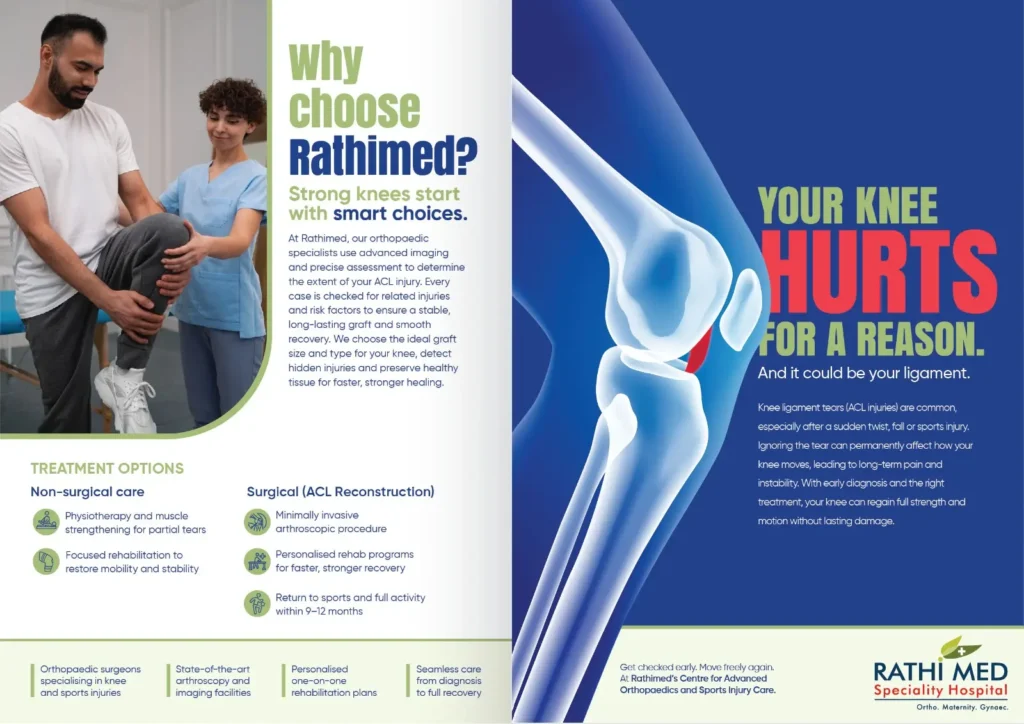
Advanced ACL Knee Injury Treatment in Chennai: Heal Stronger, Recover Smarter
From expert evaluations to modern recovery methods, RathiMed Speciality Hospital offers complete care designed to suit your lifestyle. Move with confidence again through our advanced ACL knee injury treatment in Chennai..
Understanding Your ACL Injury
An ACL injury affects one of the key support bands inside your knee that helps keep it steady when you run, twist, jump or change direction. These injuries often happen due to sudden twists, awkward landings, quick stops, sharp direction changes, intense sports activities or unexpected falls.
Common signs include a popping sensation at the moment of injury, rapid swelling, difficulty walking and the feeling that your knee might “give way.” Acting early is important because ignoring the injury can lead to repeated instability, extra strain on surrounding areas, long-term wear and reduced ability to stay active.
ACL Injury Care in Chennai: Active Living Starts Here
We provide expert ACL knee injury treatment using advanced treatment methods with our:.
Experienced Knee & Sports Injury Experts
Our team focuses on ACL-related injuries, offering clear guidance, accurate and strong recovery outcomes through trusted ACL knee injury treatment in Chennai.
Modern Technology for Precise Assessment
With advanced treatment options, we identify the nature of your injury and create a focused recovery path. This accuracy ensures better results.
Personalized Treatment Plans
Whether you need guided strengthening, rehab support or ACI knee treatment, we tailor every step to match your activity level and lifestyle goals.
Minimally Invasive Procedures
When special care is needed, we use additional techniques that reduce discomfort and help you return to walking, twisting and playing without fear. These comprehensive methods form a major part of our ACI knee treatment in Chennai.
One-on-One Rehabilitation Support
Our rehab team works closely with you to rebuild strength, balance and full knee movement, ensuring long-term stability after ACL knee injury treatment.
Trusted Results & Full Support
With consistent outcomes and strong recoveries, Rathimed is a leading choice for ACI knee surgery in Chennai and complete ACL care. We also offer clear pricing, insurance support and 24/7 guidance from your first visit to full recovery.
Start Your Recovery Today
With expert care and structured guidance, our modern approach to ACL knee injury treatment in Chennai ensures a safe, steady return to daily life – stronger, steadier and pain-free.
Overview of ACL Tear and Its Impact
The ACL is a critical ligament that helps stabilize the knee joint. When this ligament tears, it often results in pain, swelling, and difficulty moving the knee. This injury can severely affect an individual’s ability to perform day-to-day activities or participate in sports.
Key points to understand about ACL tears:
- An ACL tear typically results from sudden movements such as pivoting, cutting, or jumping.
- The injury is often accompanied by a popping sound, followed by knee swelling and instability.
- ACL tears are graded on severity, with Grade 3 tears being the most severe and requiring surgical intervention.
Given the importance of the best treatment for ACL Tear in Chennai in maintaining knee stability, timely diagnosis and treatment are necessary to prevent further damage to the knee joint.
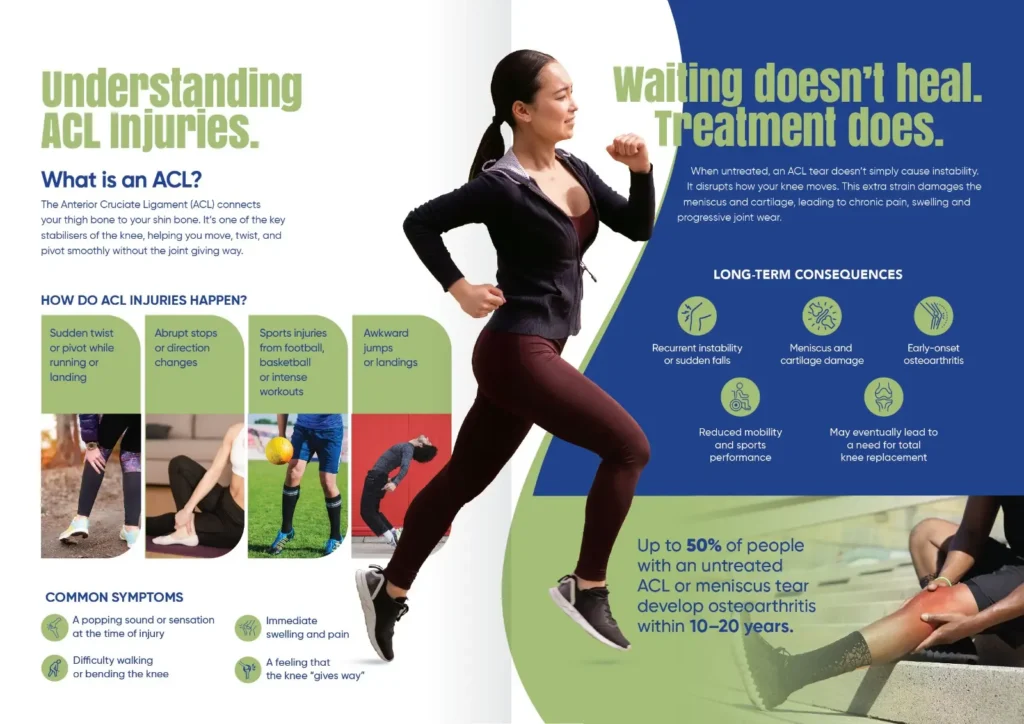
Symptoms of ACL Ligament Tear
An ACL (anterior cruciate ligament) tear can cause significant discomfort and instability in the knee. Common symptoms include:
- Severe pain and swelling within a few hours of the injury
- A popping sensation at the time of injury
- Knee instability, making it difficult to bear weight
- Loss of range of motion
- Tenderness along the joint line
- Difficulty walking or engaging in physical activities
If left untreated, an ACL tear may worsen over time, leading to further knee complications. Seeking ACL Ligament Tear Treatment in Chennai from an experienced orthopedic specialist is essential for a quick recovery.
Causes of ACL Ligament Tear
The ACL can tear due to various reasons, often linked to sudden movements or high-impact sports. Common causes include:
- Sudden stops or changes in direction (common in football, basketball, and soccer)
- Direct impact to the knee from falls, accidents, or tackles
- Jumping and landing incorrectly, putting excessive stress on the knee joint
- Overextension of the knee, causing the ligament to stretch and rupture
- Weak or imbalanced muscles, increasing the risk of ligament injuries
Athletes and individuals involved in rigorous activities should take preventive measures to avoid ACL tears. In case of an injury, considering the Cost of ACL Ligament Tear Treatment in Chennai is essential when planning for medical care.
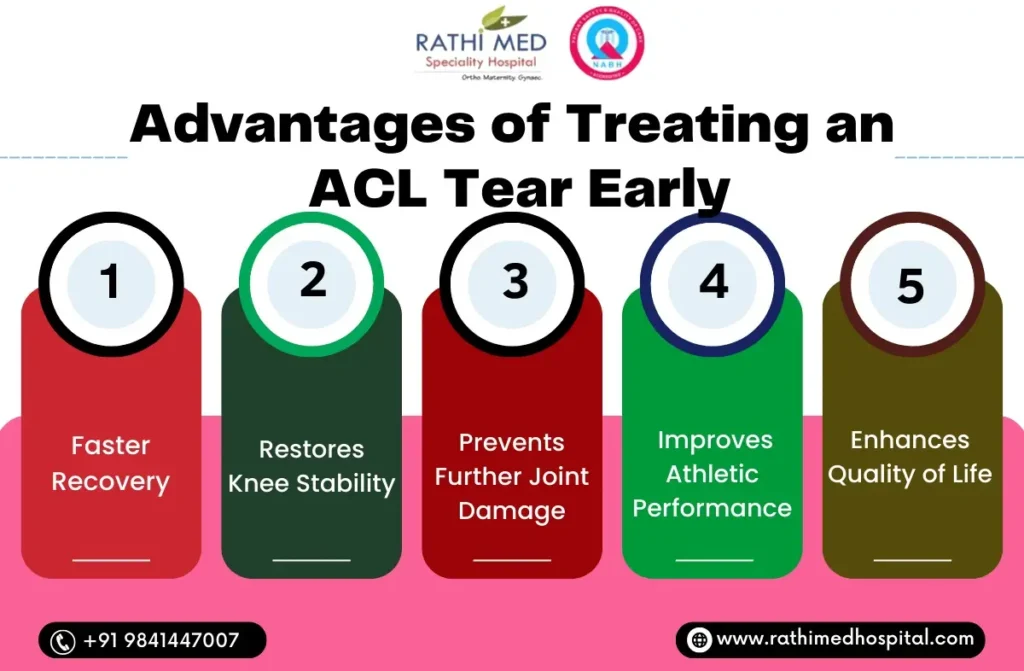
Diagnosis of ACL Ligament Tear
Diagnosing an ACL tear requires a combination of physical examination and imaging tests. The process includes:
- Physical Examination – The doctor checks for swelling, tenderness, and knee instability. Special tests like the Lachman test or pivot shift test may be performed.
- X-rays – While X-rays do not show ligament injuries, they help rule out fractures.
- MRI Scan – This imaging test provides a detailed view of the ligament, confirming the extent of the tear.
- Arthroscopy – In some cases, a small camera is inserted into the knee to assess the damage directly.
Accurate diagnosis helps determine the best ACL Ligament Tear Treatment in Chennai, whether through physical therapy or surgery. Patients should also consider the Cost of ACL Ligament Tear Treatment in Chennai to make informed decisions about their care.
Non-Surgical Treatment
While surgery is commonly recommended for severe best treatment for ACL Tear in Chennai, many patients can benefit from non-surgical treatment options, especially if the tear is partial or if the patient is not involved in high-impact activities. Non-surgical ACL treatment options focus on strengthening the muscles around the knee and improving the knee’s stability.
Non-surgical treatment options include:
- Physical therapy: One of the most important treatments, physical therapy helps to strengthen the muscles around the knee and improve mobility.
- Bracing: A knee brace can provide additional support and stability during activities.
- Rest and ice: Allowing the knee to rest and applying ice can reduce swelling and alleviate pain.
- Anti-inflammatory medications: Over-the-counter medications like ibuprofen can help reduce pain and swelling.
For many individuals, ACL tear treatment without surgery may be sufficient, especially if they are not involved in activities requiring intense knee function. However, it’s essential to consult an orthopedic expert to determine if non-surgical treatment is a viable option.
Surgical Treatment
In cases of severe ACL tears, surgery may be the best treatment for ACL Tear in Chennai option. Surgical intervention typically involves ACL reconstruction, where the damaged ligament is replaced with a tendon from another part of the body or a donor.
Key considerations for ACL surgery:
- Types of surgery: The most common procedure is ACL reconstruction, where the torn ligament is replaced. Another option is ACL repair, which involves stitching the torn ligament back together.
- Minimally invasive surgery: In some cases, surgeons may use arthroscopic surgery, which involves small incisions and faster recovery times.
- Recovery time: Post-surgery recovery can take several months, with physical therapy playing a significant role in regaining knee strength and function.
The best treatment for ACL Tear in Chennai often involves working with a skilled orthopedic surgeon who specializes in ACL injuries. A professional consultation can help determine the right surgical approach based on the injury’s severity and the patient’s lifestyle.
The Role of Physical Therapy in ACL Injury Recovery Time
Physical therapy plays a crucial role in the ACL injury recovery time, whether you opt for surgery or non-surgical treatment. It helps restore strength, flexibility, and function to the knee. Physical therapists use a variety of exercises to target the quadriceps, hamstrings, and calf muscles, which support the knee joint.
Key benefits of physical therapy:
- Restores knee strength: Helps in regaining the strength necessary to perform daily tasks and athletic activities.
- Improves flexibility: Helps to improve range of motion and reduce stiffness in the knee joint.
- Prepares for surgery: For those opting for surgery, physical therapy can strengthen the knee before surgery to ensure a smoother recovery.
Even after surgery, physical therapy remains an essential component of recovery and can speed up the healing process.
Preventing ACL Injuries: Key Takeaways
While ACL injuries are common, certain preventive measures can reduce the risk of an ACL tear. A focus on strengthening exercises, proper warm-ups, and flexibility training can go a long way in preventing injury.
Prevention tips include:
- Strengthening leg muscles: Targeting the muscles around the knee, such as the quadriceps and hamstrings, can provide additional support and stability.
- Proper technique in sports: Learning the correct technique for jumping, landing, and pivoting can help minimize stress on the ACL.
- Balance and agility training: Exercises that enhance balance and agility help improve knee stability and reduce injury risk.
By taking these steps, individuals can reduce their chances of ACL injuries, allowing them to maintain an active lifestyle without concerns.
Long-Term Effects of ACL Tear Without Surgery
When ACL tears are left untreated, or if treatment is delayed, the long-term effects of acl tear without surgery can be severe. Without proper treatment, ACL injuries can lead to ongoing knee instability, joint degeneration, and long-term pain.
Potential long-term effects include:
- Knee instability: A torn ACL makes the knee joint unstable, increasing the risk of further damage or injury.
- Osteoarthritis: Untreated ACL tears can accelerate the development of osteoarthritis, leading to chronic pain and limited mobility.
- Decreased athletic performance: Without treatment, individuals may experience difficulty returning to high-performance activities, limiting their quality of life.
It’s important to note that while non-surgical options may be effective for some, waiting too long for treatment can lead to severe consequences. Seeking the best treatment for ACL Tear in Chennai early can prevent long-term damage to the knee joint.
How to Choose the Best Treatment for ACL Tear in Chennai
Choosing the best treatment for ACL Tear in Chennai depends on several factors, including the severity of the tear, the patient’s age, activity level, and overall health. It is essential to consult an experienced orthopedic surgeon or specialist who can assess the injury and recommend the most appropriate treatment.
Factors to consider when choosing treatment:
- Severity of the tear: Minor ACL tears can often be treated with physical therapy and rest, while complete tears may require surgery.
- Activity level: Athletes or individuals who engage in high-impact activities may benefit from surgical reconstruction to return to their sport.
- Age and health: Older patients or those with existing health conditions may be better suited for non-surgical options.
It’s important to work with a trusted orthopedic clinic in Chennai to ensure you’re receiving the most appropriate care for your ACL injury.
Conclusion
In conclusion, whether you are dealing with a partial or complete ACL tear, finding the best treatment for ACL Tear in Chennai is crucial for a successful recovery. While surgery is often necessary for severe tears, many individuals benefit from non-surgical treatments, including physical therapy and bracing. The key is to seek timely medical attention and choose a treatment plan that aligns with your injury and lifestyle.
If you are experiencing symptoms of an ACL tear, don’t wait. Contact a reputable orthopedic clinic in Chennai today to explore your treatment options.
